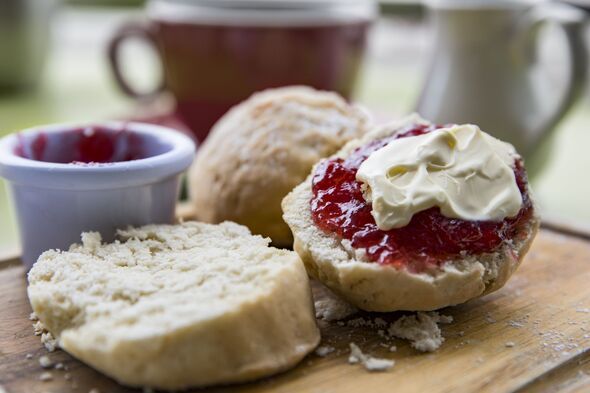

Scones are one of the easiest things to bake, even if you aren't particularly well-versed in baking. But mastering a gluten-free version is a different beast. The lack of gluten in recipes means the resulting bakes can often come out dry or dense, with scones often crumbling to pieces when you try to cut them.
Gluten-free baking generally requires adjustments to the amount of liquid and fat, and will typically need binders like xanthan gum to help achieve the right texture, so it's not simply a case of using your standard scone recipe and just swapping out the flour. If you're trying to master gluten-free scones, baking experts say adding two ingredients to your mixture is essential for creating a soft and flaky texture. The first is frozen butter and the second is sour cream.
The first important step is to ensure your butter is frozen before adding it to your mixture, as this prevents it from melting before your scones go into the oven - this step also applies to non-gluten-free scones.
Experts recommend grating frozen butter into the flour and as this melts in the oven, it releases steam and creates those desired air pockets for an airy, fluffy texture, and it also contributes to a richer flavour.
Secondly, the sour cream will add a delicious richness to the flavour of scones while also helping them to hold their shape during baking, preventing that annoying crumbly texture once baked.
Gluten-free scones need more liquid than traditional scones as the flours tend to absorb more moisture. Adding sour cream helps to keep the dough nice and moist and prevents the scones from turning dry and dense.
Meaningful Eats says: "Grating the butter and adding sour cream are the secret tricks to the BEST gluten-free scones you'll ever make. Sour cream gives these scones richness, but also helps them hold their shape during baking. Frozen grated butter is KEY to creating light, flaky, buttery scones.
"The cold butter and flour crumbs melt as the scones bake, releasing steam and creating air pockets. These pockets are what create flaky scones with crisp edges!"
Sally's Baking adds: "Keeping scone dough as cold as possible prevents over-spreading. When scones over-spread in the oven, they lose the flaky, moist, and deliciously crumbly texture. In other words, they're ruined.
"But frozen grated butter is the real key to success. Like with pie crust, work the cold butter into the dry ingredients to create crumbs. The butter/flour crumbs melt as the scones bake, releasing steam and creating air pockets. These pockets create a flaky centre while keeping the edges crumbly and crisp.
"Refrigerated butter might melt in the dough as you work with it, but frozen butter will hold out until the oven. And the finer the pieces of cold butter, the less the scones spread and the quicker the butter mixes into the dry ingredients."